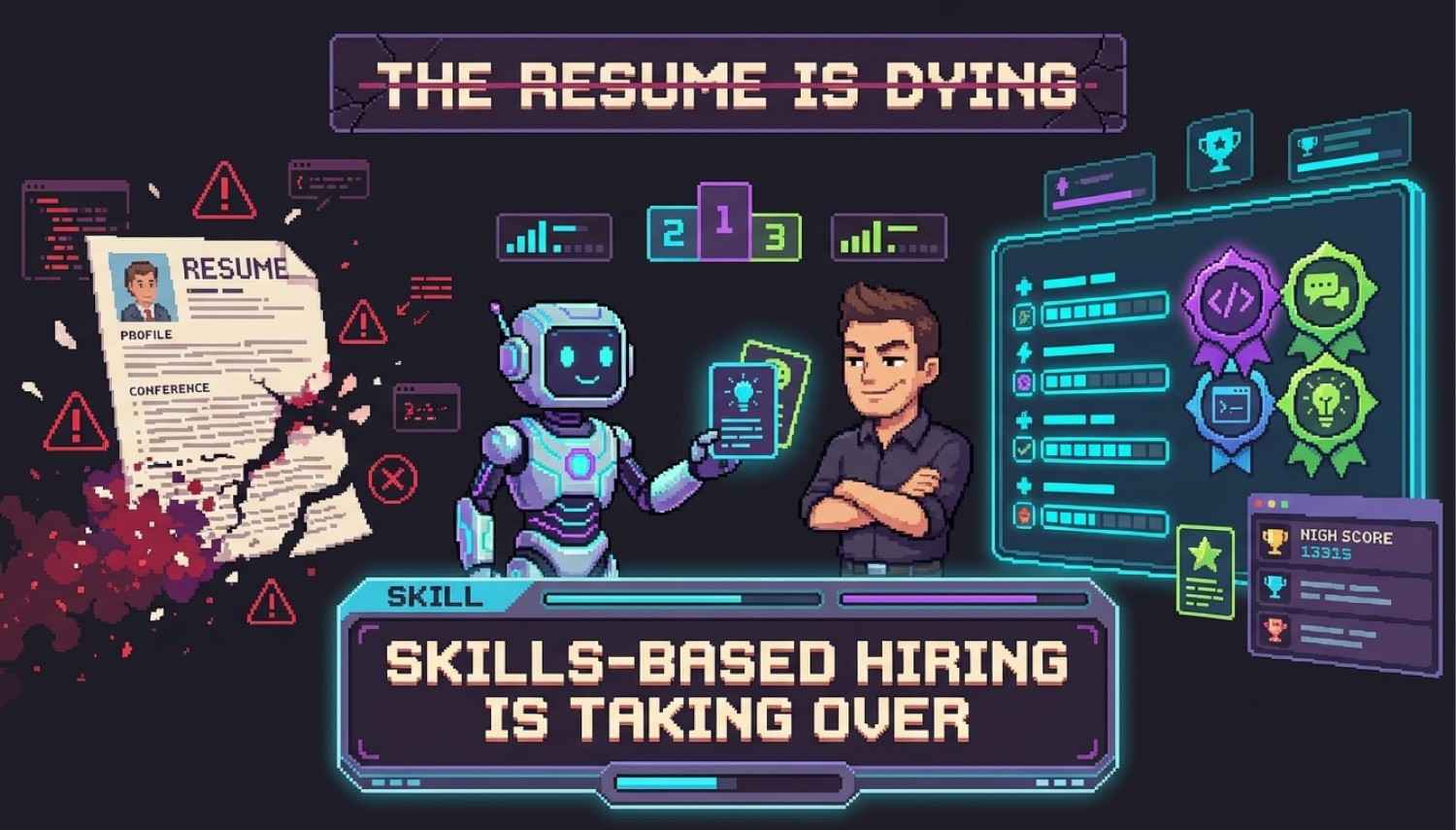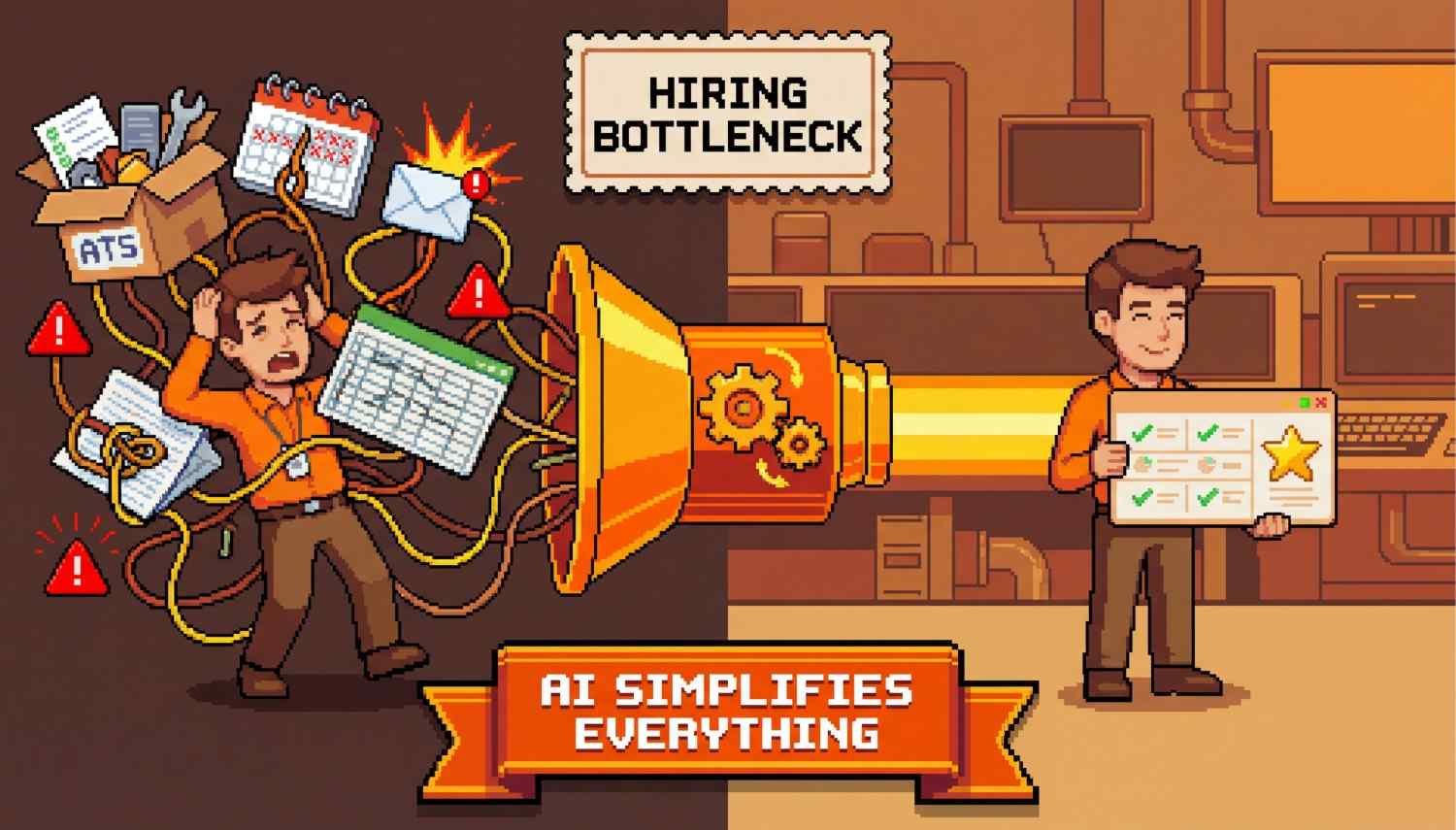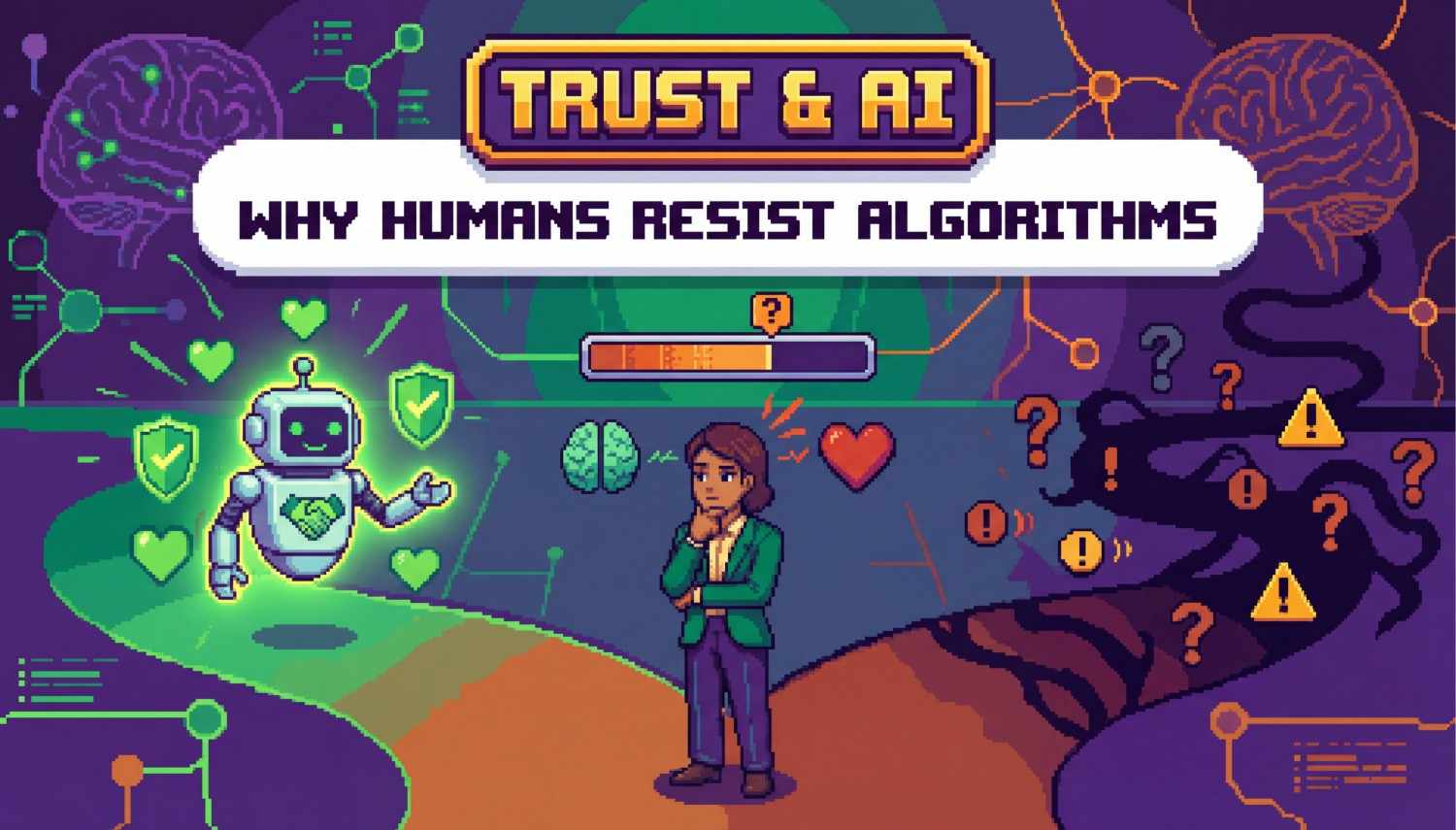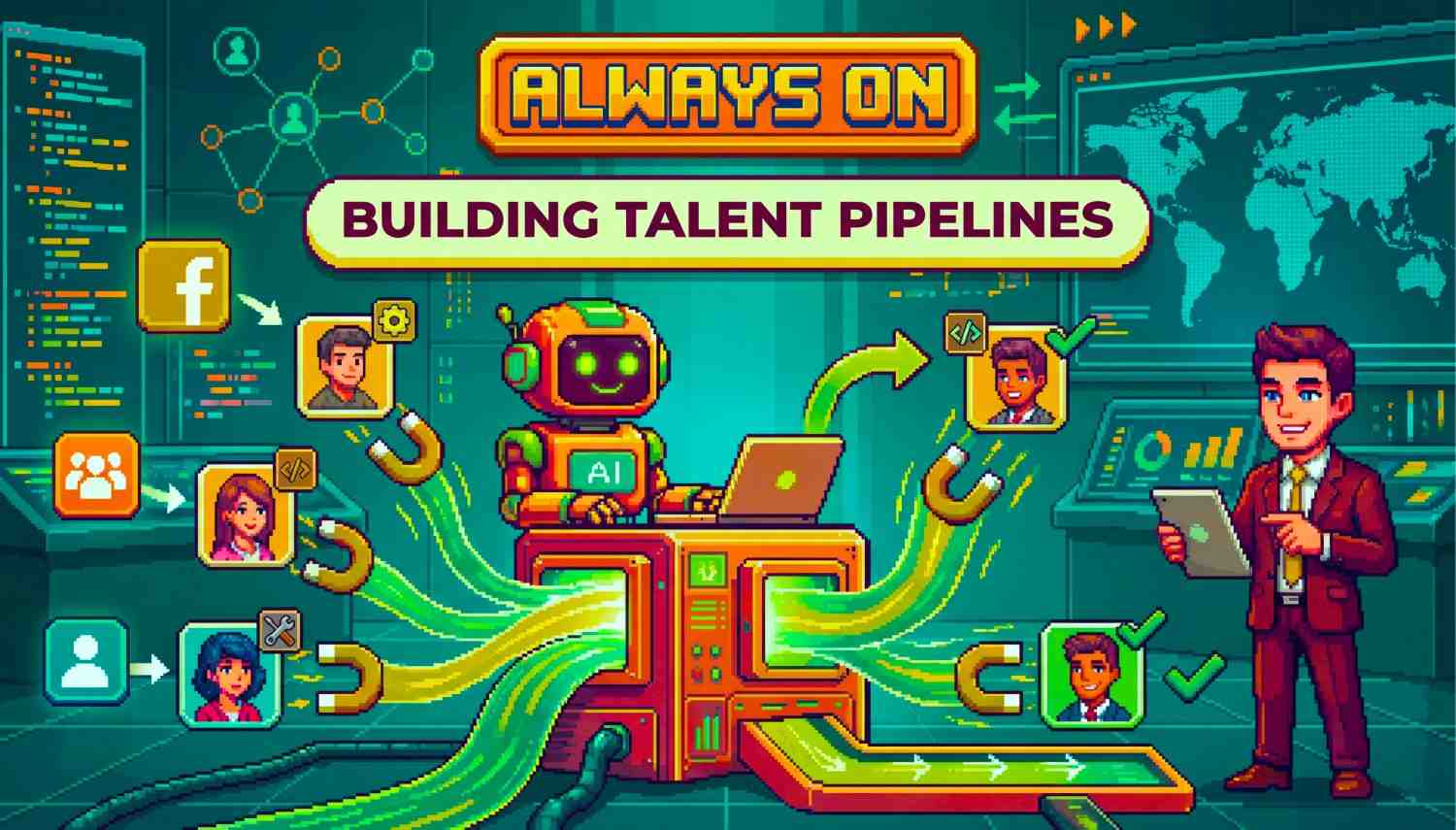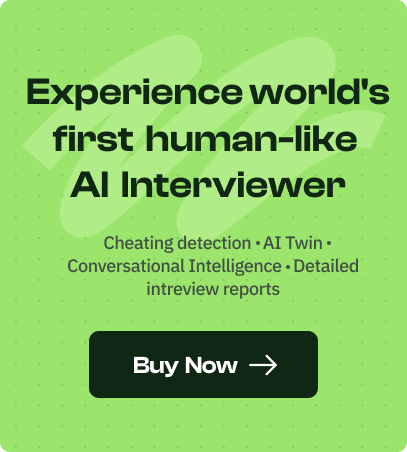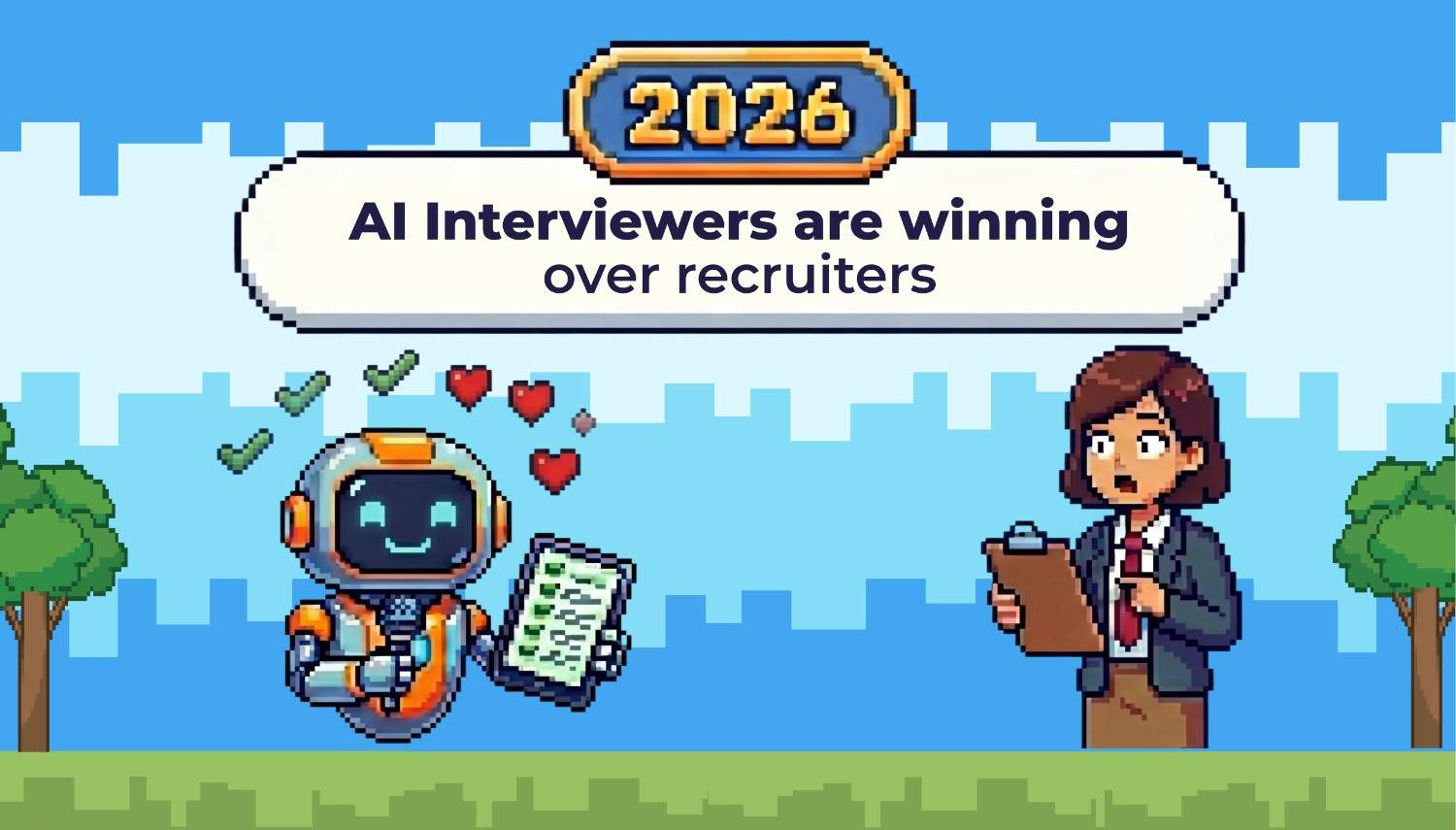

TL;DR
- Hiring has become a faster, more competitive and a lot harder process to manage at scale. Most delays still happen right at the start, where teams struggle to keep up with screening candidates.
- Bringing AI interviewers that early into the process helps organizations clear volume quickly and keep the pipeline moving without adding pressure to recruiters.
- Candidate screening becomes more structured and consistent, which makes it easier for hiring managers to compare candidates objectively and move the right people forward to the next rounds.
- Recruiters gain time to focus on real conversations and the nuances of natural assessment, which include the human elements that shape strongly intuitive hiring decisions.
- Candidates appreciate clearer timelines, flexible scheduling and an early process that feels predictable rather than long and drawn-out.
- When used in a balanced way, AI interviewers don’t replace people; they simply remove friction from the parts of hiring that slow teams down, and shift focus where it is actually needed and matters.
- Hyring can help you choose what works for your company’s requirements. Do get in touch and open a world of possibilities!
In today’s talent and job market, recruitment is more fast-paced, complex and global. Businesses face higher volumes of applicants, tighter competition, and pressure to hire fast and fairly within what can be considered a reasonable turnover for the entire process. It’s in this context that AI interviewers are emerging as a game-changer and redefining Human Resources as we know it.
When we talk about AI recruitment, what’s really happening is that companies are re-thinking the front end of hiring, which is screening, interviewing and evaluating. And in many cases, the firms that leverage AI recruiters and systems that handle candidate screening and early interviews are seeing measurable gains in efficiency, quality and candidate experiences.
In short, AI interviewers are winning over recruiters, not because humans are bad at recruiting, but because the tools humans rely on are overdue for an upgrade. The legacy ways of recruitment are noticeably falling out of favor and are unmistakably paving the way for the age of artificial intelligence. At Hyring, our AI interviewers are here to facilitate the change!
Let’s walk through why this shift is occurring, what the key benefits are, what the risks look like, and how organizations can embrace this change in a way that is considerate to human feedback and routines.
How AI Recruitment Handles Scale
One of the primary pressures on modern hiring teams is the sheer influx of applicants. Recruiters juggle hundreds or thousands of applications, hundreds of device screens, and multiple job roles simultaneously. As harsh as it may seem, traditional human-only workflows can become bottlenecks.
By contrast, when you bring in AI interviewers, you gain a tool that scales effortlessly and multitasks to a level that is appreciably more productive. A screening interview powered by AI can be launched in parallel across many candidates, scheduling hassles recede, and you avoid the constant headache of “can you do 3 pm or 4 pm tomorrow?” back-and-forth. The result is that you move candidates through the pipeline faster and can invest time where it matters most elsewhere. In other words, with AI recruitment, you conquer the volume issue without diluting the process.
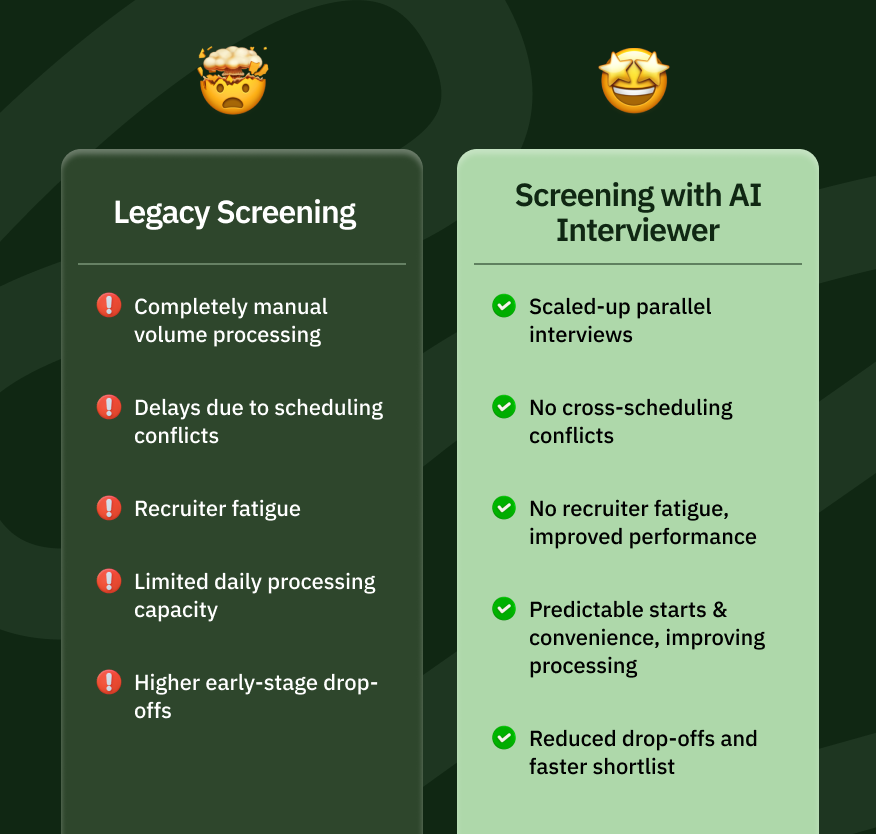

Eliminating Hidden Bias: AI Interviewers vs Human Screeners
Human bias is inevitable, even when unconsciously applied. The tone of voice, the background visible in a video call, the accents, the dressing sense– all these parameters can sway a human interviewer before the first substantive question is asked. That means qualified candidates sometimes get filtered out, or hiring criteria drift over time as the biases creep in.
With AI Interviewers, companies aim to evaluate strictly on competency, responses, skills, communication and role alignment. According to a 2023 study by Piotr Horodysky, job applicants perceive AI technology in recruitment as “useful and easy to use.” That perception matters because when candidates view the process as fair and transparent, it supports the brand strength of the employer and also improves mutual trust.
Another recent review of fairness in AI applications by Carlotta Rigotti and Eduard Fosch-Villaronga for recruitment found that the major concern isn’t whether AI can reduce bias, but how it’s built, governed, audited, and used. In other words, AI interviewers can minimize hidden bias provided companies pay attention to design, training data and oversight.
It is also to be noted, however, that they have observed that AI applications “are not flawless and can reproduce and perpetuate diversity bias, thereby discriminating against job applicants because of their personal characteristics”.
Consistency in Recruitment Automation at Work
When recruiters conduct repeated interviews, over time, the consistency fades. A question may get skipped, or different recruiters may emphasize different competencies, and the evaluation scale may drift. That inconsistency has real implications, namely, lower predictive validity, weaker quality of hire, and more risks for the company on the whole.
Enter recruitment automation backed by AI; AI interviewers run the same set of rubrics. They ask the same set of questions. They score responses with the same logic (emphasis on the similarity). They don’t tire or fatigue. They don’t favour the charismatic applicant over the competent one just because of their delivery.
What this means for talent-acquisition teams is a more stable, replicable front-end process. It means hiring managers get clean, reliable candidate assessments. The human recruiters are freed from having to keep quality control over every interview, micromanaging every single minute detail, as they can now trust the system to deliver consistent screening and focus their attention on deeper evaluation of other metrics.
Freeing Recruiters: The Role of AI in the Hiring Process
Recruiters are often bogged down by operational overload. Scheduling interviews. Sending reminder emails. Logging notes and highlighting prospects (or rejects). Sifting through irrelevant applications. What they should be spending time on is talent strategy–building relationships with candidates, understanding motivations, aligning with hiring managers and selling the company culture.
By implementing AI recruitment tools to handle the repetitive, grunt-work part of the hiring, organizations give their recruiters back the time and bandwidth to do work of higher value. The AI handles the front half (screening, scheduling, early-stage interviews); the recruiters handle the back half (complex conversations, culture fit, final decisions and candidate experience).
This hybrid model of human + machine is emerging as the most productive approach to modern hiring. That is what Hyring AI Interviewer is all about.
24/7 Candidate Experience: How AI Improves Engagement
In a global, always-on job market, candidates apply at odd hours. They may live in different time zones as well. They want unreasonable flexibility that a recruiter working 9-5 cannot always deliver on.
AI interviewers support AI recruitment by enabling asynchronous interviewing, where candidates answer pre-set questions at a time that suits them. This 24/7 availability improves completion rates, reduces drop-offs and signals to the candidate that the company values convenience and speed.
The feedback received from candidates definitely supports this. In a study, applicants said they found the AI-supported process straightforward and useful. For companies seeking to boost their employer brand, this kind of responsiveness is an asset. They also seem more professional and to-the-point, making the company highly desirable to work for.
From Intuition to Insight: Data-Driven Hiring
Traditional recruiting traditionally relies heavily on intuition. For example, a recruiter might think: “I get a good vibe about this candidate,” “He seemed well mannered,” “She seemed like the right fit,” or “His story sounded off.” While intuition has its place, a pipeline driven by gut-feel alone is hard to scale or justify - not to mention it is hardly fair in the rational scheme of things, where if one were to solely rely on it, it would devalue the role of merit.
When you introduce AI interviewers, your organization acquires measurable signals and structured analytics - metrics on response clarity, problem-solving patterns, behavioral indicators, benchmarking across cohorts - basically an array of intelligent analyses on various data points. This isn’t replacing human judgment; it's just enhancing it with the wealth of information provided by data patterns.
Over time, the system can help refine what “high-performer” behaviour looks like for your roles, giving you a feedback loop that’s grounded in reality, not just memory - it learns just like any other GPT does from external interaction and input. That’s the power of data-driven hiring in the age of AI recruitment.
Speeding Up Time-to-Hire: An Advantage
One of the fastest-moving metrics in recruitment is “time-to-hire.” When a top-tier candidate is in your funnel, any delay can mean that person drops away. Hiring fast matters.
Companies leveraging AI recruitment report significantly shorter process times at the front end. Fewer scheduling delays. Faster screening. Quicker short-lists. And because AI recruiters can work in parallel, you remove bottlenecks.
A recent meta-study highlighted that AI tools aren’t just faster–they systematically reduce lag in early-stage interviews and candidate feedback loops. Organizations gain a strategic edge by moving quickly without compromising screening integrity.
Why Applicants Prefer Automated Interviewing
You might think that candidates would resist speaking to an AI interviewer. Yet the evidence suggests a growing comfort and even preference for automation in the early stages.
In a survey, 70% of job seekers said they want transparency about how AI is being used in hiring, and 46% believed AI could reduce bias. In addition, in the same 2023 study by Piotr Horodysky, on applicant perceptions, it was found that candidates rated the AI-enabled process as “useful and easy to use.”
Why? Because for many, the early interview is stressful–uncertainty, scheduling, unknown questions, and uncomfortable or strange face-to-face interactions. This was probably further exacerbated by the advent of the Coronavirus, where the world shifted online, and subliminally became comfortable with interacting digitally as well as opposed to a physical meeting. As long as the company communicates clearly (“you’ll complete a 15-minute AI interview”), candidates respond well. That builds brand trust, as outlined before and explicit brand loyalty as well.
Continuous Learning: Why it Gets Smarter Over Time
The magic of AI recruitment is that the system doesn’t stagnate. Every candidate interaction, every outcome (to hire or not to hire), every performance review becomes data. The machine learning models underpinning AI interviewers refine their algorithms, adapt the screening logic, adjust questions, and optimize for better predictive validity continuously.
Humans don’t scale like that. A recruiter might learn lessons from a handful of interviews in a week. An AI system can process thousands of responses and refine its patterns. Over time, this means better assessments, fewer false positives/negatives, and stronger hiring outcomes. This is not to trivialise the necessity of human intelligence or, as they say, the ‘human-in-the-loop’, but to outline the power of this technology.
This continuous-learning loop is a big reason early adopters of AI interviewers are gaining a long-term advantage.
AI Interviewers Do Not Replace Us
While AI interviewers bring structure and efficiency to the early stages of hiring, they cannot replicate human intuition, empathy or the ability to build trust, relationships and connect on a personal level. Candidates still want someone who can understand their motivations, answer nuanced questions about culture, empathize with their personal issues and guide them through the ambiguity that every job change invariably involves. The strength of AI recruitment lies in supporting people–not substituting them. As Jensen Huang famously said, “You won't lose your job to AI, you'll lose your job to somebody who uses AI”.
AI interviewers handle the mundane, repeatable, systemised parts of the process, while human recruiters remain responsible for the conversations, insights and judgments that shape the final hiring decision. It’s this balance that preserves the humanity of recruitment while elevating its effectiveness.
Human + Machine: The Hybrid Future of AI Recruitment
Let’s be clear, this isn’t about replacing us. It’s about redefining our roles.
AI interviewers excel at structure, volume, consistency and data. Human recruiters excel at nuance, judgement, culture fit, empathy and relationships.
When you bring both together under an AI recruitment framework, you get a hiring process that is faster, fairer, data-driven and still human-centred.
Companies that adopt this hybrid model now position themselves for a competitive hiring advantage. They don’t wait for optional upgrades–they evolve their process proactively and get more work done, which is the ideal scenario.
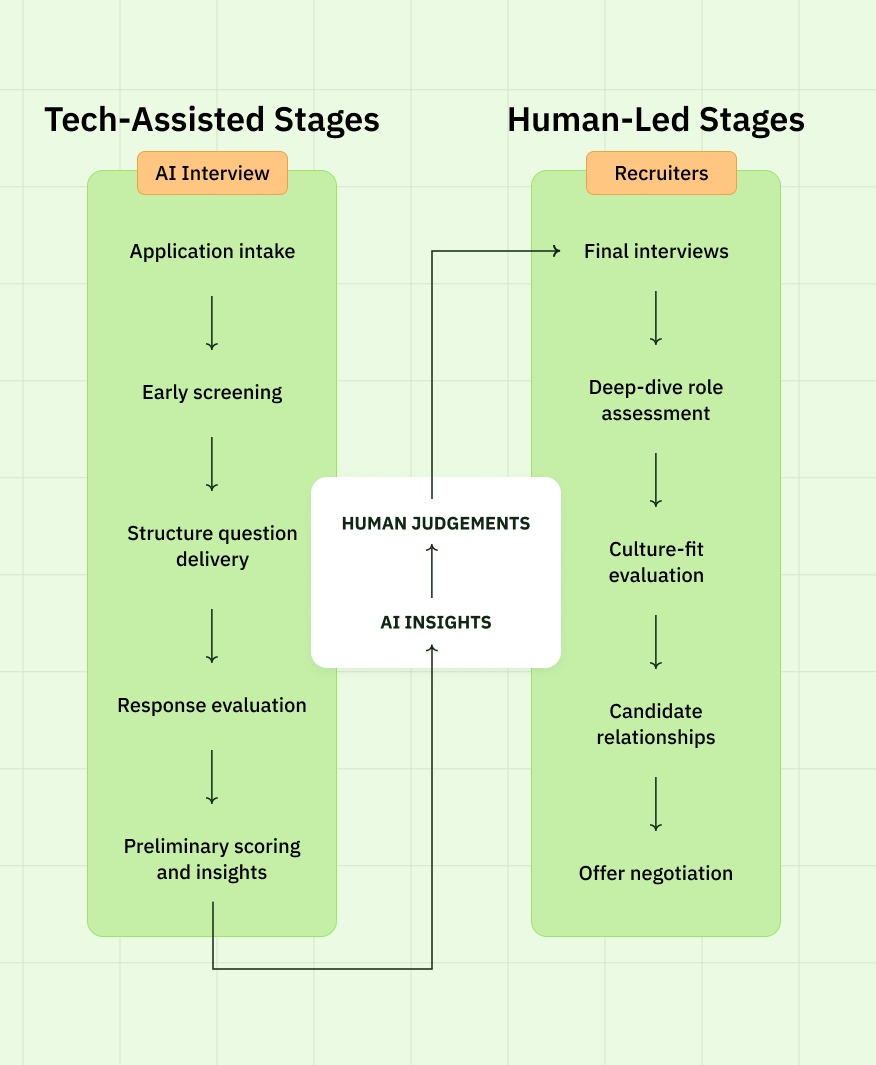

Conclusion: AI Interviewers for Smarter Hiring
In the evolving talent landscape, the question isn’t whether to adopt AI interviewers–it’s when and how. Organizations that use AI recruitment strategically are already winning. They’re enabling a more streamlined and equitable hiring process, ensuring consistency at scale and giving recruiters the space to concentrate on what matters the most - being human. Here’s the takeaway:
- Use AI recruiters to handle the front-end influx.
- Maintain human recruiters for strategic parts where the connection matters.
- Monitor the system–ensure fairness, transparency and bias control.
- Woo candidates with better AI-based processes and related marketing
- Build data loops: track outcomes and refine your model over time, thereby improving both facets of the recruitment process.
When done right, the result is a hiring engine that is efficient, fair, scalable and human-centric. That’s why Hyring AI interviewers are winning, and why your organization should be part of this monumental shift in the industry that has been taking place for the past few years with us.
Click here to connect with us on how to have our remarkable AI recruit for your company
FAQs
1. Do AI interviewers actually replace human recruiters completely?
Of course not! They only handle the early screening part, but human recruiters still make the final decisions and manage candidate relationships.
2. How do AI interviewers work?
Briefly put, they ask structured questions, analyze candidate responses and create a consistent evaluation for the recruiting team, often improving itself subsequently using learning that is data-driven.
3. Are AI interviewers fair to the candidate?
They reduce variability in early assessments, but fairness depends on proper calibration, oversight and clear guidelines that the recruiter needs to ensure/optimize. All products that you can subscribe to on Hyring are carefully calibrated to corroborate the same.
4. How do AI recruiters make the process more efficient?
They fasten the hiring process, remove scheduling delays and produce faster shortlists, allowing teams to move candidates forward in the pipeline and for human resources to tackle other challenges that may present to them.
5. Can AI handle technical or specialised roles?
Definitely, with tailored questions and scoring frameworks, AI can evaluate job-specific skills effectively and efficiently.
6. Is AI recruitment transparent and safe?
If early industry trends are anything to go by, it is. Letting candidates know how the tool is used builds trust and avoids confusion, while data privacy laws ensure safety. Hyring ensures this is up to global standards.
7. Do AI Interviewers work across time zones?
Yes, and that’s one of the best parts — it is asynchronous. Candidates can complete interviews anytime, which helps global teams reduce scheduling conflicts and streamline their pipelines to reflect a more efficient workflow.
8. Can we customize AI interview questions?
Yes. Companies can set their own questions and scoring criteria to match role needs. Hyring helps each client during the onboarding process to fine-tune their product based on a varied set of parameters that can be chosen as per their requirements.


